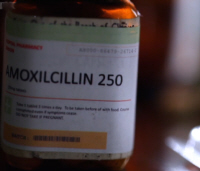Antibiotic Resistance
Dr. Ruth McNerney
Horizon - Defeating the Superbugs
The Brooke Army medical Center experienced what happens when a superbug enters a hospital. Often the only choice for doctors is to use antibiotics
which themselves can be harmful.
Medical Center Ambulances
Colonel Clint Murray "The antibiotics that I could use 10 years ago are almost completely ineffective now for some of the bacteria that we have. And
often times we are resorting to that last-ditch effort of antibiotics. If we don't fix this issue, we're eventually not going to have antibiotics."
The reason scientists are concerned is that over the last 10 years, antibiotic resistance has been growing across the world, which has forced scientists
to devise new strategies to combat it.
Dr Ruth McNerney
Dr Ruth McNerney is at the forefront of the battle against tuberculosis, a disease caused by bacteria we thought we'd confined to history.
Ruth McNerney "In the 18th – 19th century, tuberculosis was the biggest killer, full stop. I mean, not just in infectious diseases."
In the middle of the 19th century, life expectancy was just 41. In this time before antibiotics, diseases like TB spread through the crowded and
cramped streets.

Amoxicillin
Ruth McNerney "It transmits very easily through the air so it's very hard to avoid getting TB, you don't know you've been exposed, you don't have to do
anything to catch TB, except continue breathing. It would just affect everyone. Young and old."
One of the great achievements of modern medicine was the defeat of this disease with a cocktail of antibiotics. Today, over 8 million people live in
London without giving a thought to TB. But our crowded cities are still the perfect playground for bacteria.
Ruth McNerney "We pour into the city every day, we pour down the tube, onto the buses, out round the streets. If someone had infectious TB, and
they were coughing out the tiny droplets then it would be very easy to infect so many people. It would spread very, very easily. Now if we can
imagine that we didn't have the antibiotics to treat TB, well, we'd be in big trouble because that's the only way we can stop TB spreading."
Ruth McNerney
But the fear now is that our achievement in controlling this disease is being threatened. Dr McNerney is seeing a rise in cases of antibiotic-resistant TB.
Ruth McNerney "We're now seeing the emergence of strains of TB that are resistant to the drugs. And that's becoming quite a serious problem. One of
the issues is that we don't know how much drug resistance there is because it's actually quite difficult to measure."
For now, the resistant strains showing up in the UK can still be treated by a small number of antibiotics. But outside the UK, Dr McNerney has
seen a new strain of TB emerge that is resistant to all of the antibiotics we have to treat it.
Ruth McNerney "It could arrive tomorrow on an aeroplane. It might already be here. We don't know. We just have to be on our guard. We just can't afford
to let this genie out of the bag."
